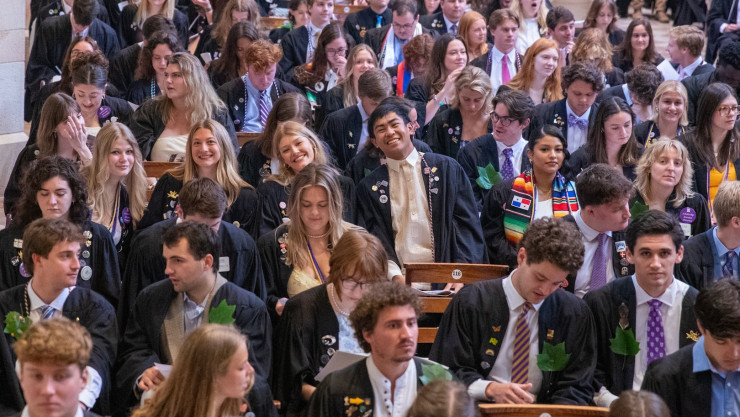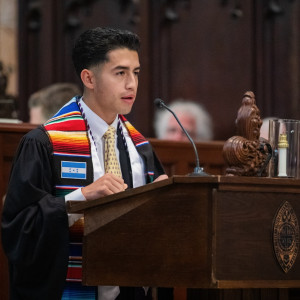Read Tony González's Full Remarks Below
Good morning. To the members of the faculty, administration, and staff—
To our distinguished guests and honored alumni—
To the families and loved ones whose presence reminds us of the roots from which we come—
And to the Class of 2025—
It is with deep humility and sincere gratitude that I stand before you this morning.
I am honored to have been selected as this year’s recipient of the Algernon Sydney Sullivan Award—an award that represents not individual achievement alone, but a shared commitment to character, service, and integrity. It is a privilege that reflects not only my own path, but the people and values that have guided it.
Today marks the closing of a chapter written in extraordinary times. Our class began its journey at a moment of national and global upheaval. We arrived in the wake of a pandemic that reshaped education, community, and the world itself. Many of us stepped onto this mountain unsure of what it truly meant to belong—masked, distanced, adjusting not only to college, but to human connection after long separation.
And yet, through this uncertainty, something remarkable happened. We rebuilt—not just our routines, but our relationships. We renewed traditions, restored the rhythm of campus life, and redefined what it means to lead, to serve, and to carry one another forward.
When we crossed through the gates of the Domain for the first time, we did so at a moment unlike any other in recent memory. The world was not fully healed. Institutions—educational, civic, even personal—were still reeling from the impact of a global pandemic. Ours was a class shaped by disruption before we ever sat in a
classroom together.
Some of us arrived after months, even years, of virtual learning. Others were met with immediate isolation through quarantine protocols. The simple act of gathering—of forming friendships, of learning in person—was, for us, neither assumed nor guaranteed.
But perhaps because of that, we understood the value of community more quickly than most. We didn’t inherit campus life—we built it back. We learned what Sewanee traditions looked like not just by watching, but by reviving them. When structures were uncertain, we provided the scaffolding. And when the community
felt fragile, we chose to invest in it—with intention, with heart, and with hope.
We came not into certainty, but into responsibility. And we accepted it.
Today, we stand not just at the edge of the Domain, but at the threshold of what comes next. We do so as people who have changed—not only in what we’ve learned, but in who we’ve become.
We are scholars, yes—but also builders of community, bearers of tradition, and witnesses to transformation. We are no longer the uncertain first-years who arrived amid mask mandates and contingency plans. We are now those who know what it means to persist—to serve others while striving toward our own callings, to hold space for grief while still cultivating joy, and to remain rooted even when the world feels in motion.
Some of us will leave here with awards and honors. Others will leave with stories of quiet perseverance: the first time we spoke up in class, the long nights working between assignments, the weight of responsibilities carried without fanfare. These stories, often unseen, are no less significant. Together, they form the fabric of this
class.
For me, this journey has been both academic and personal. I have been many things during my time here—a student of politics, a restaurant host, a rider on the Sewanee Equestrian team, and a sailor in uniform in that order. Each role has taught me something. Each one has deepened my belief that service and education are not separate paths, but parts of the same calling.
And while my time at Sewanee was briefly interrupted this spring by a military mobilization, it was never derailed. If anything, it reminded me that education is not confined to the classroom—and that commitment often requires sacrifice, not just in theory, but in practice.
That same spirit of commitment is something I’ve seen reflected in our professors. In a time when education is under scrutiny—where funding is uncertain and resources are stretched thin—they have continued to teach, to challenge, and to care. And today’s celebration is proof of their consistent impact. Every diploma given is not just a student’s achievement, but a professor’s legacy. So to every faculty member who stayed late to review drafts, who sparked questions we didn’t yet know how to ask, and who continued to show up even when the world made it harder to do so—thank you. This day belongs to you as much as it does to us.
Their encouragement has shaped not only our intellect, but also the decisions that define who we are becoming. In my case, that support made all the difference.
I’d like to briefly share a moment from earlier in my journey …
There’s always been something in me that felt called to serve—called to wear the uniform and contribute to something greater than myself. But when I began the college application process, Sewanee wasn’t on my radar. I hadn’t toured it. I hadn’t even heard of it. Yet through the Posse Foundation and its scholarship, Sewanee chose me—and for that, I will always be grateful.
During my sophomore year, I learned that Sewanee had once been a military academy. That detail stirred something in me—something I thought I had left behind. And that’s when I began the process of enlisting. I knew it would be difficult. I would need approval from the Deans, from Posse, from those entrusted with guiding my education. I told myself: if even one person said no—if one door closed—I would set it aside and study abroad instead.
But no one said no.
Soon after, I finished my spring semester, wrapped up my duties as a proctor, and helped coordinate the commencement ceremony for the Class of 2023. Forty-eight hours later, I was standing in Great Lakes, Illinois—on the toe line, expression fixed, waiting for further instructions from my Recruit Division Commander, staring straight ahead with what I can only describe as a thousand-yard stare.
That, too, is part of what Sewanee gave me: not just an education, but belief—belief in the possibility of doing something different, something demanding, something deeply rooted in purpose.
So where are we going?
The world we are entering today, in many ways, is more uncertain than the one we came from. A world marked by political division, ecological strain, economic disparity, and information overload. A world where truth is often contested, leadership is often absent, and education itself has become a battleground.
But we are not entering it empty-handed.
We carry with us the habits of reflection that Sewanee demanded of us. The ability to pause before reacting, to listen before speaking, to ask not just what is possible—but what is right.
We will be asked to navigate complexity. We will be asked to make decisions in rooms where the stakes are high and the answers are unclear. We will be asked to do more than succeed—we will be asked to serve.
And while many of us are still discovering the shape of our path ahead—whether in law or public service, education or health, ministry or the arts—we do not need to wait to begin living with purpose.
Because the truth is, the world doesn’t just need talent. It needs people of character. People who can stay steady when the ground shifts. People who can see the dignity in others, even when it’s hard. People who can make promises—and keep them.
Before I close, I want to take a moment to thank some of the people who are here for me today—my mom, my dad, and my uncle.
They are my heroes. They are my foundation.
In the late 1990s, they left behind their home country of Honduras so that I could be born into a better life here in this great country. They gave up their own dreams so that I could fulfill mine.
From my dad and uncle working side by side through scorching summers and bone-chilling winters in construction … To my mom caring for children and cleaning homes with quiet dignity …
I will never forget what you’ve done—for me and for my sister, Elliana.
I am proud to call myself a Latino Honduran American.
And if I may, just for a few seconds—I want to speak directly to those in the crowd, or those tuning in, in Spanish:
A todos los latinos y hispanohablantes que están escuchando hoy: quiero tomar un corto tiempo para reconocerlos y que esto sea una prueba de que nuestros sueños también importan. Que nuestro trabajo, nuestras raíces y nuestro idioma, el español, son dignos de respeto. Nunca se avergüencen de quienes son—porque hoy, uno de los nuestros se gradúa y tiene el honor de hablar en este escenario. Este momento también es suyo. Felicidades a todos los padres y las madres, familiares, amistades que celebran un graduarte latino o hispanohablante de Sewanee—es un orgullo, y me alegra ver la comunidad prosperar.
In a toast just a few days ago, Mr. Shipps said something that has stayed with me: “Sewanee was a dream. Now it’s time to wake.” That dream taught us how to hope. Waking up—that’s how we begin to build.
And that’s what we must do now.
To wake—to the world as it is.
To wake—to the people we are still becoming.
To wake—and carry with us the best of what this place taught us.
We’ve been given something rare: time on a mountain, surrounded by mentors, classmates, and questions that pushed us beyond ourselves. Now it’s our turn to bring that experience into the world—to become the kind of people who elevate the spaces we enter, who speak truth even when it’s difficult, and who serve without waiting for recognition.
If there’s one thing I’ve learned—whether from a classroom or through military training—it’s that you don’t have to change the world overnight.
You just have to show up.
With consistency. With humility. And with courage.
Show up for your communities.
Show up for the people who feel unseen.
Show up for the version of yourself that dared to dream big enough to get you here.
And if you ever doubt that you’re capable, remember this moment. Remember that you stood here. That you earned this. That you crossed through the gates and left better than you came.
Because now, the world beyond the Domain is waiting.
And we are ready.
Congratulations to the Class of 2025.



